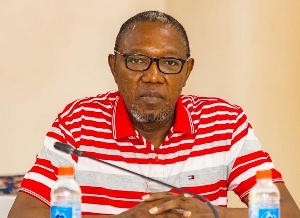Health News of Sunday, 15 September 2013
Source: Daily Guide
Cholera kills 100
According to experts, a national disaster is likely to befall the nation if drastic measures are not taken to eradicate cholera in the country as 100 deaths were recorded last year alone.
Ghana is still maintaining the very practices that leave people vulnerable to cholera infection.
These sentiments were expressed by a Consultant for Communication and Development of United Nations Children’s Fund, (UNICEF) Ghana, Maurice Ocquaye and John Yaw Donkor, a Deputy Director of Water Management Department at the Kumasi Metropolitan Assembly, KMA.
They were speaking at a day’s training workshop on sanitation for a cross section of journalists at Fumesua, near Kumasi, in Ashanti Region.
The workshop which brought together about 20 journalists, was organized by Ghana Water and Sanitation Journalists Network (GWJN) with support from UNICEF and the Japan Government.
Mr Ocquaye explained that there were about 9580 cholera reported cases resulting in 100 deaths last year, however, there have been a few incidences, but no deaths this year.
Despite these statistics, the reality is that Ghana is only lucky and or at best “Ghana is sitting on a time bomb and without proactive steps, it is only a matter of time that lives will be lost.”
He was shocked that in the 21st century where civilization had advanced due to the abundance of information, technology and knowledge, Ghana is still battling with cholera.
He was disappointed that Ghana calls itself a developing country and yet many lacked potable water, where there still exist open wells shared with animals, untreated water, people not washing their hands after visiting the toilet, among others.
He stressed that “the situation is still bad….but it is only a matter of miracle that no there are no deaths and high prevalence of cholera yet. Many people are still ignorance of the symptoms and treatment, while others are confusing cholera with diarrhoea and before one is aware, the unfortunate has happened.”
Mr Ocquaye therefore called for the reintroduction of the extinct public health inspectors fondly referred to as “nsaman nsaman” who hitherto ensured that the public and communities observed strict personal and communal hygiene as well as maintained good sanitation measures.
John Yaw Donkor explained that cholera affects the intestines and could lead to death if left untreated.
He explained that it takes a few hours to five days before one is infected while symptoms often showed in two to three days.
An infected person could die within 24 hours after showing symptoms if there is little or no treatment, because an adult who weighs 70kg can lose 10 to 18 litres of fluid alongside vomiting, rapid heart rate, loss of skin elasticity, low blood pressure, thirst, muscle cramps, restlessness among others.
He therefore advised the public to keep good personal and communal hygiene.
Entertainment









